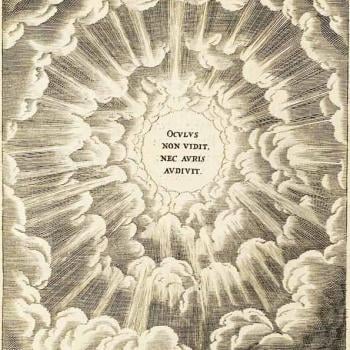 The First Cause, the Creator of all, transcends all names and titles which we use to discuss it. This is because of such names and titles come from and employ conventions which would otherwise limit and impose upon the First Cause all kinds of meanings which cannot appropriately be applied to him. Having gone through several important attributes which are often used to name God throughout the fifth chapter of the Mystical Theology, Dionysius extended his apophatic analysis to the most common name or idea usually attributed to the First Cause: God. The term God serves as the primary convention which we use to reference the transcendent, super-essential, unnamable cause of all. It is a good term, and so long as we understand it as yet another convention instead of an absolute predication, it serves as a basic reference point for theological discussions.
The First Cause, the Creator of all, transcends all names and titles which we use to discuss it. This is because of such names and titles come from and employ conventions which would otherwise limit and impose upon the First Cause all kinds of meanings which cannot appropriately be applied to him. Having gone through several important attributes which are often used to name God throughout the fifth chapter of the Mystical Theology, Dionysius extended his apophatic analysis to the most common name or idea usually attributed to the First Cause: God. The term God serves as the primary convention which we use to reference the transcendent, super-essential, unnamable cause of all. It is a good term, and so long as we understand it as yet another convention instead of an absolute predication, it serves as a basic reference point for theological discussions.
Ordinary people, who have not been trained in philosophy or theology, often will mistake what is meant by the word “God,” and will become even more confused when we mention a “divine nature.” For most people, God is seen as a super-being, that is, as a being which is greater than any other being and yet a being like any other being. This means they understand God in a dualistic sense, as a being who is over and against other beings, separate and distinct from them. This dualistic understanding, which divides being and places God within its domain, makes for a limited, not a transcendent, understanding of God. Likewise, when this notion of God is properly explored, it allows for the potential of many such super-beings, for a plurality of Gods. Divine nature is something which is found within the domain of being and therefore can be shared among many beings. Whatever can be said to be equal to the greatness of being contained within the notion of the divine nature would therefore be a God. Scripture, likewise demonstrates the truth of this by using the expression “God of Gods” as a way to indicate the transcendent first cause, implying his transcendence from the other beings which can be designated as a God, and yet sharing something in common with them by them all being called Gods. The term God, therefore, implies something which has a divine nature, a nature that can be shared with others, so that the term God does not apply only to the transcendent first cause alone. Even if only one such super-being, only one God, can be shown to exist, this does not mean others cannot grow in being to become equal to the being found in God and become a God.
The transcendent first cause, which we call God, cannot have any equal, cannot be comprehended by anything, cannot be seen as having a nature which can be shared by any other thing; for this reason, though we call him God, and we indicate that he has a divine nature, we must understand this is all merely convention. We are employing a dignified term for something which transcends the term itself. We are talking about something which transcends even the notion of Godhood, a notion which has been constructed by the human mind to discuss the excellent potentialities of being. For this reason, when negating what we say about God, Dionysius had to say that what we call God is ultimately not even God, and he did this by writing neither [is he] Deity (θεότης – that is, divine nature).
In The Divine Names, Dionysius employed the general patristic etymological definition for God: “Deity is the Providence watching over all.”[1] Theos, God, Θεός,( theós) was generally speculated as coming from θεωρέω (theōréō), which means “I look” or “I behold.” The title or name of God was said to be given to all those who ruled from on high; that is those greater beings who looked down upon the earth to direct or guide it; the term, applied to a group of such beings, was slowly extrapolated to become used for the one greater transcendent cause of all. When the other gods were denied, the term was still seen as appropriate for God, and used to help describe him because he observes and guides all things, as Nicholas of Cusa observed: “For, indeed, God, who is the summit of all perfection and who is greater than can be thought, is called ‘theos’ by virtue of the fact he observes all things.” [2] The term, God, then was applied because of the general overview God had over all things. He was over all, and so sees and knows all things, and in this way, more than any other being, is said to be a God, to be an observer who oversees all things. Nonetheless, the nature implied by the term God, the divine nature suggested by the presumed etymology, would suggest God is a limited but great being, greater than any other being but still a being like other beings, which is over the rest of being, overlooking it from his far vantage point. This notion, however, is far less than the transcendent immanence which is over all things and with all things and in all things, with whom and from whom, nothing can stand over against as a second separate from him. This is why Augustine was able to say that angels can be called gods, because they represented such super-beings which the term God was often used to suggest; [3] we, likewise, can talk about the God of Gods to show that what we are talking about with the name of God is something which transcends the ordinary meaning understood by the term God, and yet it suggests some commonality which is shared by them all. Therefore, the convention, while valid, is to be understood as just another such name of convention, which has a limit to its usefulness and must itself be transcended through negation so that we can properly use it and not be limited by the implications implicit in the title itself.
This, likewise, is true, not only with those who follow the classical etymology for the notion of “God,” but also for anyone who generally applies all kinds of qualities to God based, often, on their notion of Godhood from pagan myths. All such discussions treat various mythological notions of the gods as all equal, as all representing possible contingent super-beings. Each have their qualities, which, however great, nonetheless represent some limited being. God, then, is often understood as a super-representation of such otherwise super-beings, but still seen as a being, fitted into and caught within the domain of being itself. This is what causes many objections to the existence for God, because God is being understood within the limits implied by the term God. So long as we ignore the imperfection of the term and the problems which can emerge if we do not recognize the limited applicability the term has for the transcendent first cause, we will find all kinds of disputes possible.
God, therefore, is not God: that is, what we call God, what we apply the label to, is not really a God, a super-being which partakes of a divine nature shared by other super beings. God does not possess the divine nature, but transcends it, as it is the creator of that nature as well. The term, nonetheless, is applicable so long as we understand it in relation to our understanding of God’s creative activity. Here, we can observe it acts as God, and it is appropriate for kataphatic theology to use the term God for him, but we must always remember that the use of the term does not truly suggest or what the transcendent cause is in himself, but only what we can know of it through our engagement of it through his divine energies.
[IMG=Stained Glass Windows Looking Up [CC0 Creative Commons] via pixabay]
[1] Dionysius, Divine Names. Trans. James Parker (London: James Parker and Co,, 1897), 120.
[2] Nicholas of Cusa, The Vision of God in Nicholas of Cusa’s Dialectical Mysticism. Trans. and ed. Jasper Hopkins (Minneapolis: The Arthur J Banning Press, 1988), 119.
[3] See St. Augustine, City of God IX.23 in NPNF1(2):178..
Stay in touch! Like A Little Bit of Nothing on Facebook













